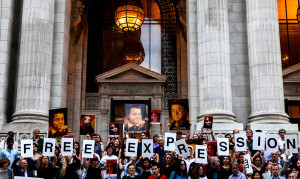By AMY QIN October 16, 2015
 Protesters at a rally against Chinese censorship in front of the New York Public Library ahead of a BookExpo America event in May. A large delegation of publishers from China attended the trade gathering as guests of honor.
Protesters at a rally against Chinese censorship in front of the New York Public Library ahead of a BookExpo America event in May. A large delegation of publishers from China attended the trade gathering as guests of honor.
Sam Hodgson for The New York Times
This may be remembered as the year China’s publishing industry truly went global. In May, a large delegation of Chinese publishers attended BookExpo America, a major publishing trade event, as international guests of honor. And on Thursday, the Publishers Association of China, a government-backed industry group, was admitted to the International Publishers Association, a Geneva-based federation of more than 60 organizations whose mission includes promoting the freedom to publish.
But in light of China’s ascendance in the publishing industry, 12 American publishers have signed a pledge to work against the censorship of foreign authors’ works in China, now the second-largest publishing market, behind the United States.
“As publishers, we commit ourselves to a considered and principled approach to dealing with Chinese censorship,” the pledge read. “While we bring common values to questions of free expression and censorship worldwide, the pace of our engagement with China renders that market an important and emblematic case deserving particular attention.”
The pledge was announced on Thursday by the PEN American Center, which spearheaded the movement, and was timed to coincide with the Frankfurt Book Fair, the largest annual gathering of the publishing industry. Those who joined the pledge include prominent publishing houses like Penguin Random House, Macmillan Publishers, W. W. Norton & Company and Grove/Atlantic.
“This is something that we need to stand up to,” said Morgan Entrekin, the president and publisher of Grove/Atlantic, speaking by telephone from Frankfurt. “Particularly on the occasion of China being invited into the I.P.A., we need to set standards for the future so that mainland Chinese publishers can say to whoever is making decisions there that these are the standards that we need to adhere to.”
The pledge is a response to a report released in May by the PEN American Center that showed how the translated works of foreign authors are sometimes published with unauthorized excisions. Books most likely to be subject to censorship are those that deal with sex or with delicate political issues, such as the crackdown on democracy protests around Tiananmen Square in Beijing in 1989, Taiwan, Tibet, ethnic minorities, Communist Party leaders and party history.
The American author Paul Auster and the former poet laureate Robert Hass were among the writers that the report cited as having had works censored without their knowledge. In the Chinese translation of Mr. Auster’s novel “Sunset Park,” passages about the detention of the Chinese dissident and writer Liu Xiaobo in 2008 were cut without the author’s approval.
“PEN’s researchers found that, in many instances, foreign authors – and their agents and publishers – do not have sufficient knowledge of the workings of Chinese censorship to do all they can to ensure that their books are not censored or minimize censorship,” the report said.
In signing the pledge, the publishers agreed to help authors negotiate with Chinese editors and publishers to minimize censorship in translated books. For content that is censored, the statement outlines measures that publishers can take to help authors make the excised material available to Chinese readers by other channels. Because many book rights are controlled by agents, the broader publishing industry needs to address the issue together, Mr. Entrekin said that.
“The show of leadership on the part of the publishers will be catalytic,” said Suzanne Nossel, executive director of PEN American Center, speaking by telephone from New York. “China represents a very large and important market for publishers and I think given the size of the population, the pace of urbanization and the rising levels of education, it’s a tremendous long-term market opportunity for them.”
“At the same time, it’s also clear that this is an issue of principle, and these are values of freedom of expression that these publishers have built their businesses on,” she added.
There remain, however, financial considerations.
“I’m curious to know if the U.S. publishers are willing to dedicate any resources to this issue,” said Peter Hessler, a writer for The New Yorker, in emailed comments. “In the end, this issue is economic as well as political.”
Mr. Hessler, who has had three of his four books translated and published in China, pointed to the low pay for translators as a big issue facing many foreign authors seeking to publish a high-quality translation of their works in China.
Hiring an independent editor to check the translated manuscript against the original would add to a publishing house’s costs. But Mr. Entrekin, for one, said that Grove/Atlantic was ready to take on such additional costs.
“It’s not going to be rocket science to figure out which books are going to be censored,” he said.
Some in the Chinese publishing industry welcomed news of the pledge. Zhang Jiren, an editor at the Shanghai Translation Publishing House, said that increased communication between authors and their Chinese publishers would benefit the editing process on both ends.
For detail please visit here
